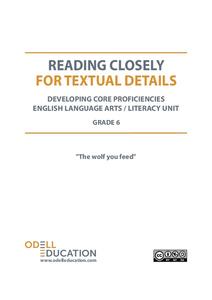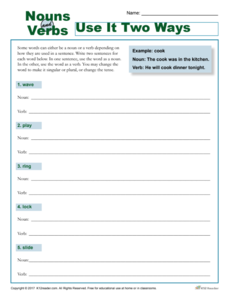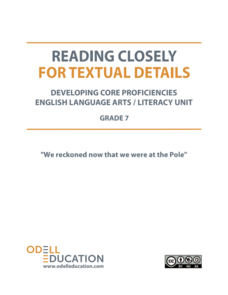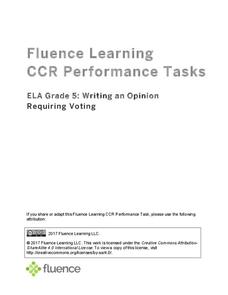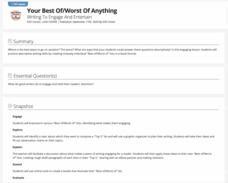Odell Education
Reading Closely for Textual Details: Grade 6
Close reading doesn't mean to literally read text close to your face, but rather to pay attention to particular details in order to develop a deep and purposeful understanding of text. The first part of a five-part resource provides an...
Fluence Learning
Writing About Informational Text: Music and the Brain
Even if you've never picked up a musical instrument, chances are that music has directly impacted your mental and emotional development. Sixth graders engage in a reading activity in which they read two articles on the impact of music on...
K12 Reader
Nouns Verbs: Use It Two Ways
Scholars show what they know about nouns and verbs in a worksheet that requires them to read five words then use them in two sentences—as a noun and a verb.
K20 LEARN
Who Am I? Creating And Editing Descriptive Writing
With descriptive writing, the pleasure is in the details. Young writers learn how to add sensory details to a paragraph about themselves. They read a short paragraph and identify the sensory details used. After revising their draft...
Odell Education
Reading Closely For Textual Details: Grade 8
Only a thorough understanding of history can save us from repeating it. Practice close reading skills with an eighth grade unit that focuses on 19th century America, including European immigration into Ellis Island and Frederick...
DePaul University
A Garden in Lawndale
We are all capable of changing the world for the better; all it takes is a spark. Read about a group of seventh grade learners in Chicago, IL who took it upon themselves to improve their community by turning a vacant lot into a garden....
K20 LEARN
Who's Coming To Dinner? Descriptive Writing
"The Dinner Party" is the anchor text in a lesson designed to encourage writers to use sensory details in their stories. After brainstorming descriptive words and phrases for the five senses, class members read Mona Gardner's stark tale...
Poetry4kids
Evoking the Senses in a Poem
Budding poets choose a topic for a sensory-filled poem. Authors describe that topic using detailed language based on the five senses. Then, switch the senses to create a fanciful poem intended to add a touch of fun to the objective.
Curated OER
Writing a News Article
Join the newspaper business with a series of lessons and exercises focused on elements of journalism. The packet focuses on distinguishing fact from opinion, writing effective headlines, sequencing events, and editing and proofreading a...
Scholastic
A Reading Guide to A Wrinkle in Time
Accompany a reading of Madeleine L'Engle's classic tale, A Wrinkle in Time, with a detailed guide equipped with 15 informative and useful chapters. Scholars discover who the author is, why she wrote the book, and crucial story elements...
Poetry4kids
How to Write an Apology Poem
Put a silly spin on making amends with an apology poem. Budding poets think of a time they were made to apologize although they didn't mean it. They then turn their experience into a poem that offers details and ends with an explanation...
Odell Education
Reading Closely for Textual Details: Grade 7
Enhance the reading experience with a set of lessons designed to improve textual analysis. Seventh graders use guiding questions to read both informational text and literature closely in the first part of the unit. Next, they work on...
EngageNY
Writing to Show, Not Tell: Dialogue, Sensory Words, and Strong Action Verbs
Consume, gobble, devour ... serving up strong verbs! Writers focus on using dialogue, strong action verbs, and sensory details in their writing. After analyzing a model narrative, they apply their learning to their own hero's journey...
National Council of Teachers of English
Writing Acrostic Poems with Thematically Related Texts in the Content Areas
Scholars scour thematically aligned texts to gather a bank of words they can use in an original acrostic poem.
EngageNY
End of Unit Assessment, Part 1, Continued: Revising Vocabulary and Conventions based on Feedback
Howdy, partner! Scholars partner up to look at the last two rows in the writing rubric. After discussing the details in the rubric about organization and conventions, learners use colored writing tools to circle feedback in their...
ReadWriteThink
Robert Frost Prompts the Poet in You
A great poem begins with an idea, an image, or an event that evokes a feeling. Middle schoolers read biographical information about Robert Frost and then identify details in three of his poems that reflect his life. Using suggestions...
Curated OER
Nonfiction Genre Mini-Unit: Persuasive Writing
Should primary graders have their own computers? Should animals be kept in captivity? Young writers learn how to develop and support a claim in this short unit on persuasive writing.
DLTK
St. Patrick's Day Creative Writing Prompt #2
Make narrative writing festive with a St. Patrick's Day-themed writing prompt! Sscholars provide a detailed account of Sean the Leprechaun and an amazing event that happened to him on a joyful spring morning.
Polk Bros Foundation
Show, Then Write What You Learn
After reading a text or covering a new topic, have class members fill out the four boxes on this page with facts. Individuals can use words or drawings to represent the facts.
Bermingham City Schools
Opinion Writing
It's no secret that children can be very opinionated, but rather than fight against this natural tendency, embrace it with this primary grade writing project. After a shared reading of a children's book about persuasion, young learners...
Fluence Learning
Writing an Opinion Requiring Voting
Challenge writers to compose an essay detailing their stance on, and the history of, voting. Three assignments, each broken down into three parts, requires fifth graders to take notes, read and complete charts, write paragraphs, compare...
K20 LEARN
Your Best Of/Worst Of Anything: Writing To Engage And Entertain
It was the best of places! It was the worst of places! Middle schoolers practice their descriptive writing skills by creating an e-book about the best of/worst of topics. A series of activities about descriptive writing and worksheets...
Houghton Mifflin Harcourt
Writing Prompts for Middle School
Scratching your head when it comes to engaging writing prompts? Check out a list of prompts designed for middle school classes, which includes topics for persuasive writing, expository writing, how-to essays, personal narratives, and...
Lakeshorelearning
Read and Write about It
Reading informational text is a skill that transcends subjects and grade levels. Practice reading about different topics in various formats with a language arts lesson that includes opportunities for writing and research as well.


